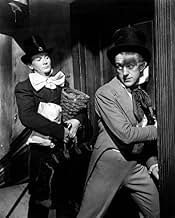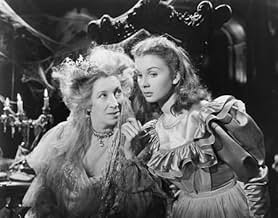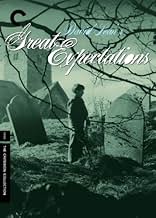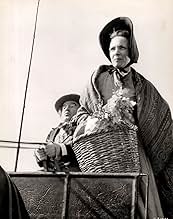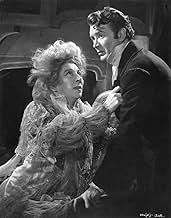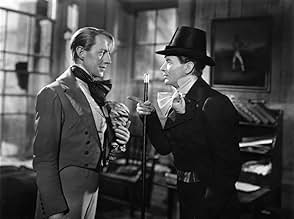CALIFICACIÓN DE IMDb
7.8/10
28 k
TU CALIFICACIÓN
Un huérfano humilde de pronto se convierte en un caballero con la ayuda de un benefactor desconocido.Un huérfano humilde de pronto se convierte en un caballero con la ayuda de un benefactor desconocido.Un huérfano humilde de pronto se convierte en un caballero con la ayuda de un benefactor desconocido.
- Dirección
- Guionistas
- Elenco
- Ganó 2 premios Óscar
- 11 premios ganados y 4 nominaciones en total
Tony Wager
- Young Pip
- (as Anthony Wager)
O.B. Clarence
- The Aged Parent
- (as O. B. Clarence)
Opiniones destacadas
As a fan of many so-called classic films, I am nonetheless aware that there is some validity to the criticism that early movies (say, anything before Brando in Streetcar) as a rule have less vitality than their modern counterparts, are formulaic to a fault, and strain the limits of modern attention spans more than can be fully blamed on the viewer. Great Expectations treads miles clear of any of these criticisms, and so I recommend it in particular to anyone who has a general disdain for films that a) were released in the first half of the 20th century and/or b) were shot in black and white. Here is one that can change your mind.
Naturally, given the talents of the author, the plot itself leaves little to be desired. Further, David Lean, his cast, and his crew, have done a splendid job translating Dickens to the screen. This is indeed, as the Criterion Collection folks have classified it, one of the "Great Adaptations." I doubt that there is a better cinematic adaptation of any Dickens novel and am almost certain there is none in which the Dickensian English dialogue flows more pleasantly and naturally. The actors herein deliver Dickens as Olivier himself delivered Shakespeare. Nor is this an unimportant accomplishment; having to spend a couple of hours listening to actors who sound more like they are delivering a series of quotes (though admittedly they are) than that they are actually conversing can be positively unbearable. Indeed I think that's the main thing that people are hitting upon when, with broad brush-strokes, they paint older films as tedious. Great Expectations is the antidote to just this attitude.
If you are a lover of classic films, you have likely already seen this one or will do so regardless of my review, but if, on the other hand, you entertain the possibility of watching Great Expectations with a deep-seated skepticism I implore you to give it a chance. I have every confidence you'll be pleasantly surprised and find yourself drawn into what is, after all, a fascinating story.
Naturally, given the talents of the author, the plot itself leaves little to be desired. Further, David Lean, his cast, and his crew, have done a splendid job translating Dickens to the screen. This is indeed, as the Criterion Collection folks have classified it, one of the "Great Adaptations." I doubt that there is a better cinematic adaptation of any Dickens novel and am almost certain there is none in which the Dickensian English dialogue flows more pleasantly and naturally. The actors herein deliver Dickens as Olivier himself delivered Shakespeare. Nor is this an unimportant accomplishment; having to spend a couple of hours listening to actors who sound more like they are delivering a series of quotes (though admittedly they are) than that they are actually conversing can be positively unbearable. Indeed I think that's the main thing that people are hitting upon when, with broad brush-strokes, they paint older films as tedious. Great Expectations is the antidote to just this attitude.
If you are a lover of classic films, you have likely already seen this one or will do so regardless of my review, but if, on the other hand, you entertain the possibility of watching Great Expectations with a deep-seated skepticism I implore you to give it a chance. I have every confidence you'll be pleasantly surprised and find yourself drawn into what is, after all, a fascinating story.
I came to watch this film with no knowledge of the book, having never read it and only the vaguest knowledge of a couple of the characters - Magwitch the escaped convict and the jilted Miss Haversham. I had absolutely no idea how events would turn out or what would happen to the characters involved. Good for me - no baggage!!
Taken, then, in its own right I can say that I was quite staggered at the overall quality of this film in every respect and from the very opening shots: The acting, cinematography, costumes, sets, lighting, effects etc. etc. were all perfect and gave no hint of the film's vintage. Surprise surprise (or maybe no surprise), the storyline was quite superb - the ripe 'Dickensian' dialogue was a pleasure to hear and the plot was intelligent and interesting while maintaining a steady pace throughout.
All in all, a very pleasant experience for me and I'm glad it eventually found its way onto my radar!
So - a timeless masterpiece in my opinion and well worth watching by anyone looking for a break from modern CGI-laden disaster/action movies or who do not want to see yet another instance of the Americans saving the world from extra-terrestrial menace.
Nine out of ten without a moment's hesitation....
Taken, then, in its own right I can say that I was quite staggered at the overall quality of this film in every respect and from the very opening shots: The acting, cinematography, costumes, sets, lighting, effects etc. etc. were all perfect and gave no hint of the film's vintage. Surprise surprise (or maybe no surprise), the storyline was quite superb - the ripe 'Dickensian' dialogue was a pleasure to hear and the plot was intelligent and interesting while maintaining a steady pace throughout.
All in all, a very pleasant experience for me and I'm glad it eventually found its way onto my radar!
So - a timeless masterpiece in my opinion and well worth watching by anyone looking for a break from modern CGI-laden disaster/action movies or who do not want to see yet another instance of the Americans saving the world from extra-terrestrial menace.
Nine out of ten without a moment's hesitation....
This adaptation of Charles Dickens's classic novel, directed by David Lean from a script he co-adapted, and photographed by Guy Green, is a miracle of invention, economy and detail. Every piece on every set; every line of dialogue; every gesture and line reading of every actor; every black-and-white frame of this beautiful film seems perfect. Dickens's characters, situations and themes are all vividly dramatized. Pip, Pocket, Joe, Mr. Jaggers, Magwitch andunforgettablyMiss Havisham, are all here and all ready to move, amuse, frighten and entertain anyone willing to spend time with them.
I haven't read the book since I was thirteen. I vividly remember Miss Havisham, but I don't remember noting the contrast between her and Magwitch, the ex-convict. She becomes bitter and vengeful after a great heartbreak; he becomes great of heart through one small act of kindness. That's what made the movie for me this time; but clearly there's richness to spare for future viewings.
There is so much here not only for Dickens fans, but for anyone who loves movies. I especially liked that shot from Pip's point of view as he becomes sick. It's the kind of crazy effect beloved of filmmakers, too; but I love it not so much for itself, but for being the right shot at the right moment. Some directors hide, others show off, but directors like David Lean know how to do both and know when to do which.
I haven't read the book since I was thirteen. I vividly remember Miss Havisham, but I don't remember noting the contrast between her and Magwitch, the ex-convict. She becomes bitter and vengeful after a great heartbreak; he becomes great of heart through one small act of kindness. That's what made the movie for me this time; but clearly there's richness to spare for future viewings.
There is so much here not only for Dickens fans, but for anyone who loves movies. I especially liked that shot from Pip's point of view as he becomes sick. It's the kind of crazy effect beloved of filmmakers, too; but I love it not so much for itself, but for being the right shot at the right moment. Some directors hide, others show off, but directors like David Lean know how to do both and know when to do which.
I read the novel decades ago, but from what I remember the major points and most of the minor points of the novel are intact. The novel and the film weave a tale of a 19th century England completely lacking in compassion, and that always went doubly so for orphans such as Pip, yet he does encounter more than his share of good luck.
Of course the most interesting character in the novel is Miss Haversham. In the film as in the novel she is dumped at the altar on her wedding day in her youth and has harbored a grudge against the entire male sex since then and has lived as though stuck in that day for decades, still wearing her rotting wedding dress. What I don't understand is why the film does not include her being financially defrauded by her fiance as the novel does. The novel weaves a tale of an unbelievably small world, but the film omits a couple of the more unbelievable plot turns to its credit.
The lawyer, Mr. Jaggers, who attends to Pip's affairs when he is in London, is also a most interesting character. He has a hangman's noose as a souvenir in his office and also seems to be actively collecting the death masks of the recently executed as a new one pops up every time Pip visits him. Yet when he discusses the matter of the death penalty and criminal justice in England Jaggers truly seems to get the cruel randomness of those institutions.
One thing I can say without spoiling anything is how completely unrecognizable Alec Guinness is as Herbert Pocket, Pip's roommate in London. He doesn't even have that trademark gravelly voice at this point, his first credited film appearance.
I don't even like costume dramas or period pieces, but I highly recommend this one. The fine acting by the cast and Lean's direction really drew me into the story.
Of course the most interesting character in the novel is Miss Haversham. In the film as in the novel she is dumped at the altar on her wedding day in her youth and has harbored a grudge against the entire male sex since then and has lived as though stuck in that day for decades, still wearing her rotting wedding dress. What I don't understand is why the film does not include her being financially defrauded by her fiance as the novel does. The novel weaves a tale of an unbelievably small world, but the film omits a couple of the more unbelievable plot turns to its credit.
The lawyer, Mr. Jaggers, who attends to Pip's affairs when he is in London, is also a most interesting character. He has a hangman's noose as a souvenir in his office and also seems to be actively collecting the death masks of the recently executed as a new one pops up every time Pip visits him. Yet when he discusses the matter of the death penalty and criminal justice in England Jaggers truly seems to get the cruel randomness of those institutions.
One thing I can say without spoiling anything is how completely unrecognizable Alec Guinness is as Herbert Pocket, Pip's roommate in London. He doesn't even have that trademark gravelly voice at this point, his first credited film appearance.
I don't even like costume dramas or period pieces, but I highly recommend this one. The fine acting by the cast and Lean's direction really drew me into the story.
As I watched the beginning of this film, I couldn't help but compare the story to the only other Charles Dickens story I was familiar with: Oliver Twist. It looked like it was going to be another story of a nice, respectful boy being abused by nasty adults. However, as soon as the young boy turned into a man, the similarities ended. Poor Oliver had a lot of ups and downs but life was basically pretty good for the boy, "Pip" in "Great Expectations."
Because of that, I didn't think this Dickens tale had the emotional impact of Oliver Twist, but still was great storytelling. The last 20-30 minutes of this film tied so many things together it really made it a satisfying film. From what I just researched, it sounds like the book was a lot harsher story.
My only major complaint with this film is the casting of the lead character, "Pip," as an adult, which involves most of this movie. John Mills looked way too old to be playing a 20-year-old "Pip Pirrip." In truth, he was too old. Mills was 38 when doing this role. They couldn't have found a younger actor? This guy looked and sounded like Ronald Colman, which is fine except Colman never looked 20, either! This is gross miscasting.
At any rate, I enjoyed a number of actors in here, mainly three older ones: Martita Hunt, Findlay Currie and Francis L. Sullivan. Hunt was just great as "Miss Haversham." I found her fascinating in every sentence she delivered, all of which she did while just sitting in a chair. Currie was genuinely frightening in the beginning as the escaped convict "Magwitch." However, what a transformation that man made in this story! Francis L. Sullivan emotes convincingly enough to play the
lawyer "Mr. Jaggers" and be fun to view, too. The rest of the actors were fine, but nothing memorable.
To me, the acting took a back seat to Dickens' story and to the film's cinematography. Knowing David Lean directed this film, that Criterion usually produces nice-looking DVD transfers and that "Oliver Twist" looked fantastic on disc, I was paying as close attention to the cinematography, and I enjoyed it. The story wasn't that intense until the finale, which was very well done. The romance was a bit questionable and is a sad-but-true comment how many people, at least us men, can be "in love" with a shallow woman who offers nothing but good looks. (Speaking of looks, Valerie Hobson pretending to be a little older Jean Simmons in the role of "Estella' is like Margaret Hamilton passing for slightly-older Jennifer Jones. Give me a break!)
Even though the screenplay is softer than the novel, most people say it still captures Dickens' flavor, and few critics had anything but praise for this classic film. Do I prefer this movie over the aforementioned Oliver Twist? No, but only because the latter is the most stunning photographed black-and-white movie I've ever watched. ("Citizen Kane" ranking second.) This is still very good in that category. Lean and cinematographer Guy Green won Oscars for their work here, so you know it's not too shabby.
The combination of Dickens, Lean, Green and a fine cast all make this a classic movie that is certainly recommended. Don't make the mistake of choosing the insipid 1998 version with Ethan Hawke and Gywneth Paltrow. This is the only version you want to see.
Because of that, I didn't think this Dickens tale had the emotional impact of Oliver Twist, but still was great storytelling. The last 20-30 minutes of this film tied so many things together it really made it a satisfying film. From what I just researched, it sounds like the book was a lot harsher story.
My only major complaint with this film is the casting of the lead character, "Pip," as an adult, which involves most of this movie. John Mills looked way too old to be playing a 20-year-old "Pip Pirrip." In truth, he was too old. Mills was 38 when doing this role. They couldn't have found a younger actor? This guy looked and sounded like Ronald Colman, which is fine except Colman never looked 20, either! This is gross miscasting.
At any rate, I enjoyed a number of actors in here, mainly three older ones: Martita Hunt, Findlay Currie and Francis L. Sullivan. Hunt was just great as "Miss Haversham." I found her fascinating in every sentence she delivered, all of which she did while just sitting in a chair. Currie was genuinely frightening in the beginning as the escaped convict "Magwitch." However, what a transformation that man made in this story! Francis L. Sullivan emotes convincingly enough to play the
lawyer "Mr. Jaggers" and be fun to view, too. The rest of the actors were fine, but nothing memorable.
To me, the acting took a back seat to Dickens' story and to the film's cinematography. Knowing David Lean directed this film, that Criterion usually produces nice-looking DVD transfers and that "Oliver Twist" looked fantastic on disc, I was paying as close attention to the cinematography, and I enjoyed it. The story wasn't that intense until the finale, which was very well done. The romance was a bit questionable and is a sad-but-true comment how many people, at least us men, can be "in love" with a shallow woman who offers nothing but good looks. (Speaking of looks, Valerie Hobson pretending to be a little older Jean Simmons in the role of "Estella' is like Margaret Hamilton passing for slightly-older Jennifer Jones. Give me a break!)
Even though the screenplay is softer than the novel, most people say it still captures Dickens' flavor, and few critics had anything but praise for this classic film. Do I prefer this movie over the aforementioned Oliver Twist? No, but only because the latter is the most stunning photographed black-and-white movie I've ever watched. ("Citizen Kane" ranking second.) This is still very good in that category. Lean and cinematographer Guy Green won Oscars for their work here, so you know it's not too shabby.
The combination of Dickens, Lean, Green and a fine cast all make this a classic movie that is certainly recommended. Don't make the mistake of choosing the insipid 1998 version with Ethan Hawke and Gywneth Paltrow. This is the only version you want to see.
¿Sabías que…?
- TriviaSir Alec Guinness admired the way Sir David Lean directed him, singling out a close-up in which he had to laugh out loud, and which he struggled to make look unmanufactured. Lean told him to forget about the whole thing, sat by his side, and made a little signal to the camera to start turning in the course of the conversation. He said something which made Guinness laugh and then said, "Cut." Guinness: "So he got this shot on a totally false premise, but thank God. I don't think I would have ever achieved it otherwise."
- ErroresAt the end, when Pip is persuading Estella to leave Satis House with him, a 'Chad' is clearly visible drawn on the screen behind him (Chads were a popular form of graffiti in the 1940s - a character with a big nose looking over a wall). Chad is a British term; the American equivalent would be Kilroy, as in 'Kilroy was here'.
- Créditos curiososThe identity of the actress playing Molly is never revealed, because this would constitute a spoiler.
- Versiones alternativasIn some prints, after the fifteen minute "convict episode" at the beginning of the film ends, a voice-over by the adult Pip (John Mills) says, "it was a year later", as Mrs. Joe arrives home in the carriage. As now usually shown, there is no voice-over in this sequence.
- ConexionesFeatured in Moscow in Madrid (1965)
Selecciones populares
Inicia sesión para calificar y agrega a la lista de videos para obtener recomendaciones personalizadas
- How long is Great Expectations?Con tecnología de Alexa
Detalles
- Fecha de lanzamiento
- País de origen
- Sitio oficial
- Idioma
- También se conoce como
- Grandes esperanzas
- Locaciones de filmación
- St Mary's Marshes, Kent, Inglaterra, Reino Unido(opening sequence - Pip and Herbert Pocket ride in rowboat)
- Productora
- Ver más créditos de la compañía en IMDbPro
Taquilla
- Presupuesto
- GBP 350,000 (estimado)
- Total a nivel mundial
- USD 33,408
- Tiempo de ejecución1 hora 58 minutos
- Color
- Relación de aspecto
- 1.37 : 1
Contribuir a esta página
Sugiere una edición o agrega el contenido que falta

Principales brechas de datos
By what name was Grandes ilusiones (1946) officially released in India in Hindi?
Responda

